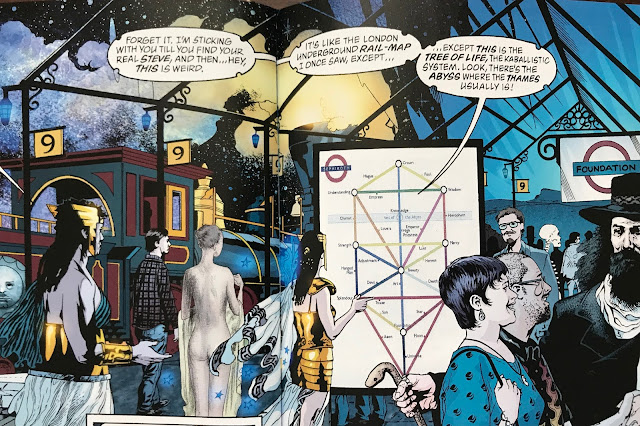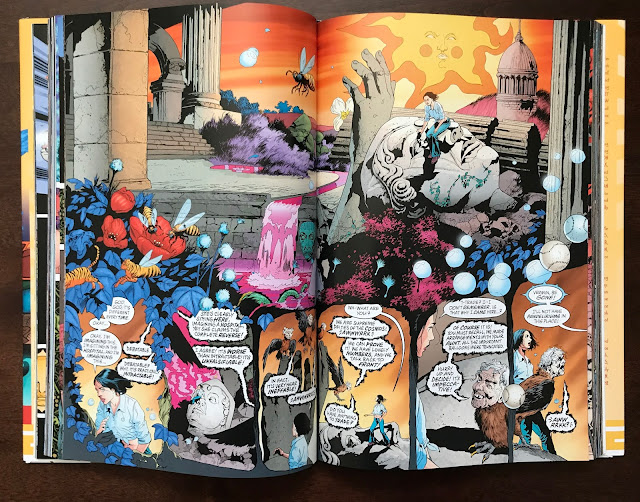Promethea 20th Anniversary Edition Book Two, by Alan Moore and J.H. Williams III
2001-2003, 20th Anniversary Edition published in 2019
When Promethea was first coming out, I thought I understood what it was about in the two or three issues I read before dropping off. The other comics series writer Alan Moore helmed with his America's Best Comics line, like Tom Strong and The League of Extraordinary Gentlemen, had a decidedly pulp tone, and as modern as they felt, they had a foot set in the history of comics and media. I figured Promethea was a Wonder Woman analogue that would allow Moore to explore her mythos as Supreme let him look at Superman. I was completely wrong.
 |
| I'm not going to rant about it, but that DC logo on an ABC book is gross |
Promethea is Promethea. And I still don't know exactly what that is, but it's barely even a story in this volume, the second of three. It follows a few subplots, but the majority of the book does not function as a story in a traditional sense of the word. It's a series of dialogues on a theme.
 |
| So this is not so much a super-hero book except in it's overall look and shape |
Promethea is a legendary character that gains form in the material world, AKA our reality, by channeling her creatively. The first volume of the series had the current Promethea, Sophie Bangs, learning about the Immateria, the realm that exists parallel to ours and is based in the power of ideas. The more humanity thinks of something, the more it exists in the Immateria.
In this volume, Sophie follows the previous Promethea into the afterlife and explores the different realms of existence.
 |
| The spheres of the universe are mapped out like the London Underground |
Moore is famously a magician, and has a non-traditional philosophy about how the universe is. How directly the mythology of Promethea parallels his own personal view of the universe, I can't say, but I suspect they are roughly the same. He describes the universe as levels of spheres that are connected to each other. Each embody principles and fundamentals of (human) existence, and the gods humanity has created reside there too.
 |
| Promethea and Promethea visit a new sphere |
Sophie travels through realms of emotion, of anger and passion, of fatherhood and motherhood, and ultimately God, and not the bearded Christian one. Things happen to the characters as they travel through, but it's hard to see it as a story, as there isn't a real goal or conflict. Rather, it is a kind of exploration of what existence is.
The thing it reminded me of most was reading the dialogues of Plato when I was a young man absorbing the classics. He wrote dialogues which seem like a story, but are much more of an information dump. That type of writing has been common in philosophical writing throughout history, (I recall reading Chinese philosophy that explained things using a similar device, as well as Piet Mondrian's book explaining De Stijl). Maybe some writers still use that idea today, but I've checked out on that form of text so I can't say. Moore has one up on those writers though: J.H. Williams III.
 |
| Williams draws an issue in high contrast to show what inner fire is about |
Williams is a lover of art, and channels all sorts of art traditions through history to bring feeling and experience to Moore's writing. To name drop a few, he does pastiches of Alphonse Mucha, Vincent Van Gogh, and Renaissance Christian art in different places. Other places, he simply draw upon his ample ambition and talent to bring the book to life.
 |
| While most of the book is done in conversations, even that falls away at points |
I've long had a preference for comics where the writer and artist were one. I prefer when a book is one person's voice, but Promethea really puts that to the test. Neither Moore nor Williams would be capable of this book by themselves, and this is truly an idiosyncratic vision. It's amazing.
The reason I picked this up was because I had head some folks say this was arguably Moore's best work, and yeah, it's like some of those really out there issues of Swamp Thing he did blown up to a three book set.
 |
| I was most of the way through the book when I realized the title pages were mapping the spheres for us as we went along. Lots of thought in every aspect of this book |
That said, I could completely understand if someone didn't enjoy this book. This second book is a description of the universe with only the lightest sprinkles of story layered on. It's not what someone signs up for when they buy a monthly comic book.
 |
| God |
In stark contrast to the book I reviewed yesterday, Sick, I mostly share the principles that Moore gets into here. He makes a point to dismantle popular Western concepts of God, good, and evil. God is not an active player, but the universe itself, with the universe a manifestation of God, more or less. Evil is not a thing to fight, but an idea within you to understand. It's a fusion of ideas from different religions and philosophies, and it's a soothing world view. Certainly it doesn't ask us to worry about Hell and eternal suffering.
I've now read two thirds of Promethea, and have one book left. I have no clue where it's going, but I suspect I'm going to like it.








